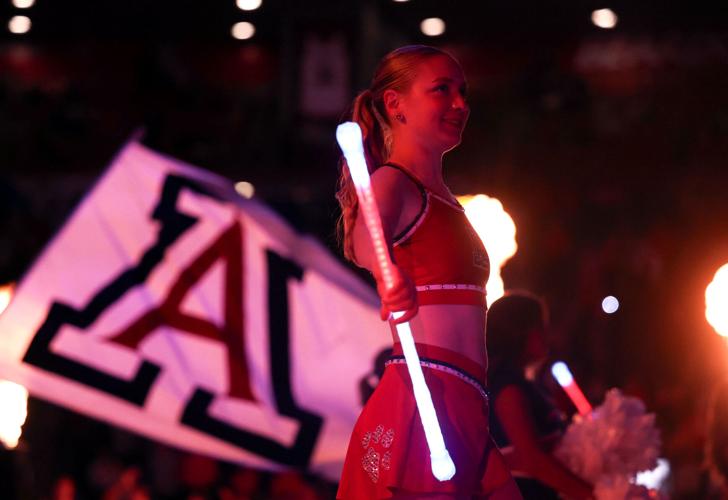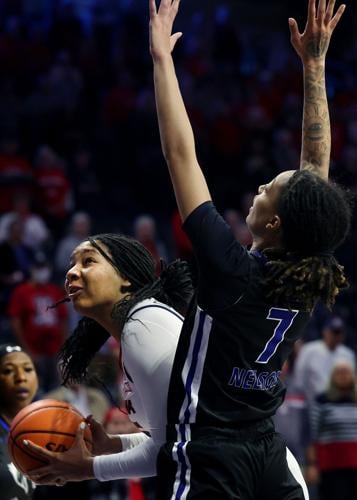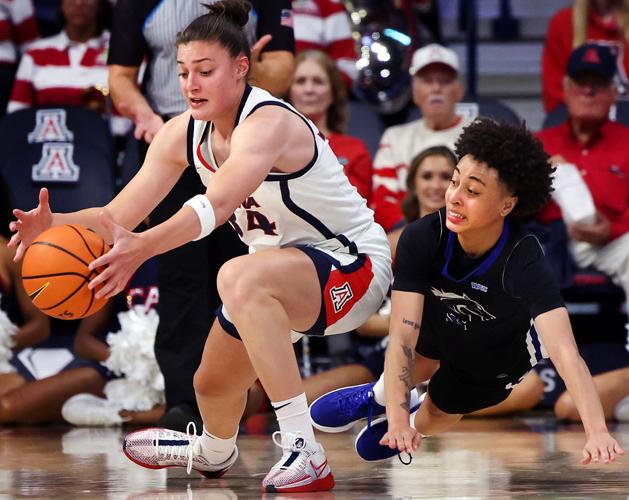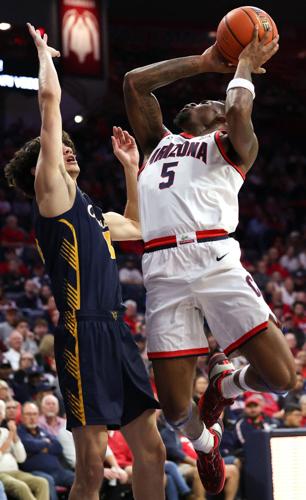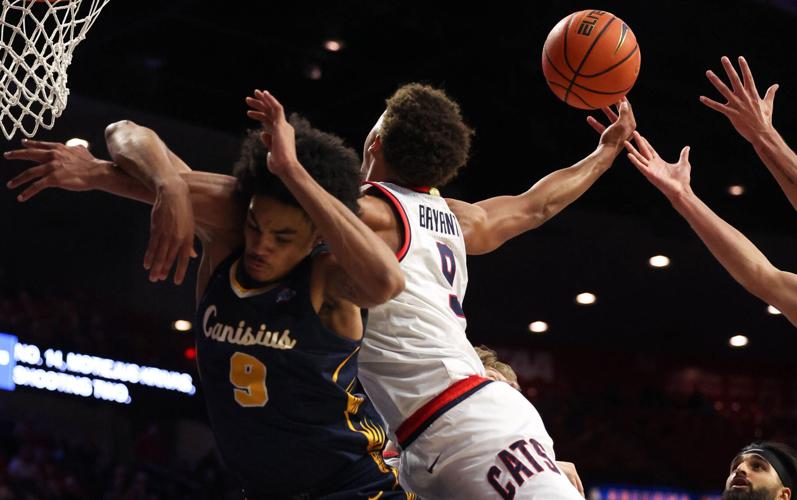Two hundred eighty-four points were scored.
Eighty-four fouls were assessed.

Michael Lev is a senior writer/columnist for the Arizona Daily Star, Tucson.com and The Wildcaster.
Six dunks were thrown down.
Two Arizona victories were secured.
The 2024-25 college basketball season opened Monday with a doubleheader at McKale Center. The UA women defeated UT Arlington 73-54 in the opener; the 10th-ranked UA men trounced Canisius 93-64 in the nightcap.
I took it all in from the press area next to the ZonaZoo. Here are my initial impressions of the Wildcats — three thoughts on each squad.
UA WOMEN
Breya’s breakthrough

Arizona forward Breya Cunningham, left, eyes the basket as she’s defended by UT Arlington forward Zoe Nelson on Nov. 4, 2024, at McKale Center.
Less than four minutes into the season, UA sophomore Breya Cunningham incurred her second foul. It was very much an “Uh-oh, here we go again” moment.
As a freshman last season, Cunningham struggled to stay on the floor. She fouled out 10 times. As Adia Barnes noted Monday, many of those fouls in 2023-24 were hand-checks and reaches “when we don’t need to.” In other words, far away from the basket.
When Cunningham checked back in midway through the second quarter, a funny thing happened: She didn’t commit another foul. And it wasn’t because she shied away from the action.
Cunningham played a key role in two consecutive defensive stops. She raised her arms and maintained her verticality. She moved her feet.
Barnes said Cunningham has worked to get in better shape, and it showed. She ran the floor and cashed in on those rim runs to make easy layups.
Cunningham doubled-doubled with 10 points and 10 rebounds. She also had two blocks. She did all that in 19 minutes. Imagine what the 6-foot-4 sophomore could do if she stays out of foul trouble.
All in Dew time
Montaya Dew made her long-awaited UA debut two minutes into the second quarter. She looked tentative at the start — like someone who hadn’t played in a real game in a very long time.
If I’m doing the math right, it’s been at least two years. Dew came to Arizona as a midyear enrollee in January 2023. She did not play that season, then injured her knee that summer and missed all of last season.
Barnes wisely is easing Dew back into action. Unlike last season, when the Wildcats at times had only six healthy players, Barnes doesn’t have to overtax anyone. She used 11 players Monday, and the bench accounted for 30 points. It felt a like a record.
Anyway, back to Dew: Her profile when she came to Arizona as the eighth-ranked player in the class of 2023 was more facilitator than scorer. She attempted only one shot in 13 minutes, a wild reverse layup that didn’t fall. But she pushed the ball end-to-end a couple of times, and that’s an encouraging sign.

Arizona forward Katarina Knezevic left, and UT Arlington guard Nya Threatt pursue a loose ball in the second half during a game at McKale Center on Nov. 4, 2024. Arizona won 73-54.
Dew faces physical and mental hurdles as she ramps up and readjusts to competitive basketball. The latter is often more difficult — expunging the injury from your mind and playing freely. It takes time.
The freshmen
Monday also marked the debuts of three freshmen: Lauryn Swann, Mailien Rolf and Katarina Kneževic. Two played significant minutes, and all three had their moments.
Swann, a spring signee, served as the backup to point guard Jada Williams and looked the part. Swann displayed a smooth stroke on her jump shot (2 of 3 from the floor, 1 of 2 from 3-point range) and excellent speed while running the floor.
After committing her lone turnover in the fourth quarter, Swann sprinted down the court for what should have been a chase-down steal. (The ball went off a UTA player’s leg, but the officials didn’t see it.)
After Arizona regained possession, Swann drove baseline and set up Kneževic for a corner 3. Soon after, Swann drew an offensive foul.
Rolf also ran the point at times. She was vocal and aggressive on offense, and the ball moved when she was on the court. She finished with nine points, six rebounds and two assists.
Rolf also had four fouls and three turnovers., so there’s still work to do.
Kneževic played only seven minutes, but she didn’t hesitate when Swann set her up for that 3-ball. It was Kneževic’s only made basket.
Kneževic also committed three fouls. Even relatively polished European players have adjustments to make when they come to the States.
UA MEN
The Big Three
On the men’s side, we got a glimpse of what should be a staple of the 2024-25 squad: Guards Jaden Bradley, KJ Lewis and Caleb Love filling up the stat sheet.
That trio combined for 46 points on 57.6% shooting, 14 assists, 12 rebounds, seven steals, two blocks and only one turnover. Each of them was plus-23 or better while on the court. Only one other Wildcat, Henri Veesaar (plus-22), was in that range.

Arizona guard KJ Lewis, right, makes his move to the basket during the Wildcats' 2024-25 season opener at McKale Center, Nov. 4, 2024.
Bradley, Lewis and Love shared the court less than 15% of the time last season, according to KenPom’s tracking data. Arizona had different perimeter players, and Lewis was a true freshman still finding his way.
They’re now part of a dynamic three-guard starting lineup that should cause opponents a lot of problems. All three have the quickness to get to the basket. Bradley and Lewis aren’t as polished from the perimeter as Love, who remains streaky. When he’s hot, he’s unstoppable.
When those three weren’t on the court, the offense bogged down at times (more on this in the next section). Coach Tommy Lloyd indicated after the game that he’s still working on rotations and would like to mix the starters and reserves more. Keeping at least one of Bradley, Lewis or Love on the floor at all times would be prudent.
Zoned out
It’s hard to imagine Arizona will face an opponent with less size than Canisius. The Griffins have only one player taller than 6-foot-8, and he didn’t play Monday.

Arizona forward Carter Bryant (9) extends his arms in an attempt to gain possession of the ball against Canisius guard Evan van der Plas, left, at McKale Center, Nov. 4, 2024.
Lloyd said Canisius played more zone defense than he expected. He should prep his team to see it a lot this season, because zone offense remains a bugaboo for the Wildcats.
After an initial burst of 3-pointers and fast-break buckets that propelled Arizona to a 20-2 advantage, the Wildcats struggled to score for stretches in the half-court. After taking that lead, they missed six consecutive shots. About midway through the second half — with rotation players still on the floor — they missed seven in a row.
It might seem like we’re picking nits here in a game Arizona won by 29 points, but we’ve seen this before; zone defenses have been the Wildcats’ Kryptonite.
Lloyd said the offense against the zone was “OK,” adding that he thought the team “got a little bit offensively sensitive” after some shots didn’t go down. He detected a drop-off in effort as a result. “It’s going to be a great teaching tool,” Lloyd said.
Arizona didn’t consistently move the ball inside-out against the zone, and its 3-point shooting wasn’t great (28.6%). In theory, the Wildcats should be a better shooting team with Love back for another year; Bradley and Lewis growing in that area; transfer Anthony Dell’Orso in the rotation (38% 3-point shooting last season at Campbell); transfer Trey Townsend showing he's capable from long range; and pick-and-pop big Henri Veesaar back from injury.

Arizona pom and cheer perform during the pregame light show at McKale Center before the game against Canisius, Nov. 4, 2024.
But it remains to be seen if that’s actually the case.
Setting a trap
The most exciting development Monday night, at least from my seat, was Arizona’s occasional deployment of a full-court trap.
The Wildcats used it only about a half-dozen times. They weren’t uber-aggressive in attacking the ball. But given their personnel — and the way the sport has evolved — it’s an idea that oozes with potential.
Bradley, Lewis and Love are twitchy, springy athletes who can make life miserable for opposing guards. Using them to apply length-of-the-court pressure plays to their strengths.
Freshman Carter Bryant also fits that mold — in a 6-foot-8 frame. Additionally, Arizona has 7-footers in Veesaar and Motiejus Krivas that it can position near the basket should the press be broken.
Another aspect of the full-court trap that’s appealing: You just don’t see many teams do it anymore.
“I'm hoping that’s something we can utilize over the course of the year,” Lloyd said. “I’ll just have to get a feel for it. I think we could have been a little bit more aggressive and opportunistic.
“The biggest thing is, can you get matched up once it comes over half-court? We spent a lot of time trying to figure that out.”
It’ll prove to be a worthwhile investment.


